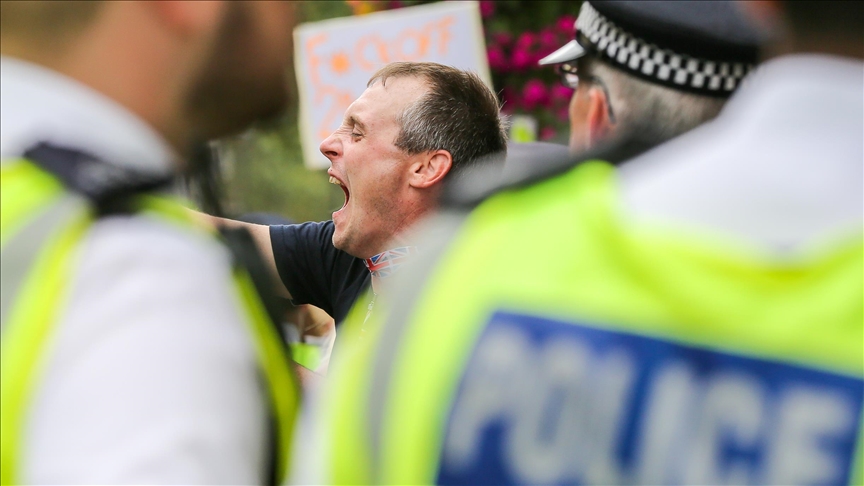UK government faces backlash over new definition of extremism
'What we feel Michael Gove in this government is doing is playing politics with extremism at the expense of certain communities,' says head of Muslim Council of Britain
 Supporters of British far-right and anti-Islam figurehead Tommy Robinson (real name Stephen Yaxley-Lennon) gather as thousands of protesters demonstrate outside the Downing Street in London, United Kingdom on August 31, 2019 ( Dinendra Haria - Anadolu Agency )
Supporters of British far-right and anti-Islam figurehead Tommy Robinson (real name Stephen Yaxley-Lennon) gather as thousands of protesters demonstrate outside the Downing Street in London, United Kingdom on August 31, 2019 ( Dinendra Haria - Anadolu Agency )
LONDON
The UK government released a new official definition of extremism Thursday, drawing criticism from civil liberties advocates and community groups.
Under the move, groups that are labeled “extremist” will be barred from receiving government funding and meeting with officials, according to an official statement.
The controversial move, which has already met with backlash over the risk of disproportionately targeting Muslim communities, was announced by Communities Secretary Michael Gove as part of a government initiative to address an "increased extremist threat" in the country since the Israel-Hamas war began on Oct. 7 last year.
Jonathan Hall, the government's independent reviewer of terrorism legislation, cautioned that the new policy could damage the UK's democratic reputation.
He expressed concerns that such measures might not be perceived as democratic, potentially tarnishing the country's standing on the global stage.
While the government has not disclosed any specific groups targeted by this definition, the announcement has caused apprehension within Muslim communities, with Zara Mohammed, secretary general of the Muslim Council of Britain (MCB), warning of unfair targeting.
Mohammed emphasized the need to combat extremism but criticized the government's approach as being politically motivated and potentially discriminatory.
She told the BBC’s Newsnight program that the new policy will cause the "unfair targeting of Muslim communities."
"Some communities are very concerned right now about being unfairly targeted. But I should first say that of course we all want to tackle extremism and we want a safe Britain. But what we feel Michael Gove in this government is doing is playing politics with extremism at the expense of certain communities…This is a list of the government that is going to be put together to label who it deems to be extreme."
The MCB, Britain's largest Muslim group, has already experienced a reduction in engagement with the government, indicative of strained relations.
Scottish leader Humza Yousaf echoed concerns raised by the MCB and Hall, highlighting the potential erosion of civil liberties and democratic principles.
The Muslim Association of Britain (MAB) also condemned the government's actions, labeling them as "a cynical move to appease the hard right while targeting mainstream British Muslim organizations."
They called for opposition to what they described as an Orwellian narrative, urging all political parties to stand against it.
"If Gove is confident in his views about the Muslim Association of Britain and other organizations, alleging extremist views and a threat to UK society, we challenge him to state them outside parliament. However, due to the fear of legal challenges, we know he lacks the courage to do so," the organization said in a statement.
Under the new definition, extremism is "the promotion or advancement of an ideology based on violence, hatred or intolerance" that "aims to (1) negate or destroy the fundamental rights and freedoms of others or (2) undermine, overturn, or replace the UK's system of liberal parliamentary democracy and democratic rights, or (3) intentionally create a permissive environment for others to achieve the results in (1) or (2)."
Anadolu Agency website contains only a portion of the news stories offered to subscribers in the AA News Broadcasting System (HAS), and in summarized form. Please contact us for subscription options.







